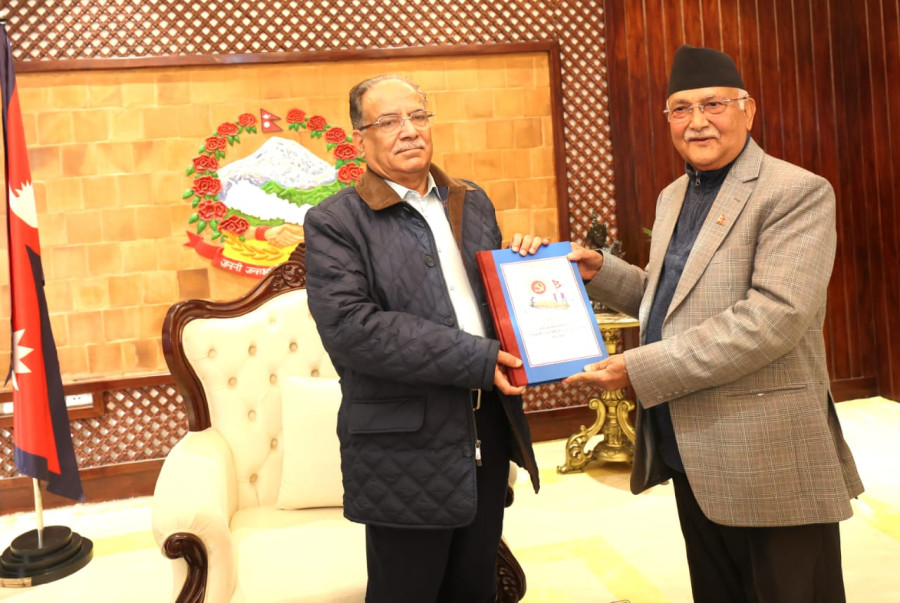Politics
CPN-UML recommends changing the alignment of Mid-Hill Highway
The opposition party presents a memorandum to the prime minister suggesting ways to develop the country’s hills and stop outmigration. UML undertook a 'Sankalpa Yatra' from the country's west to east from November 30 to December 1
Post Report
The main opposition CPN-UML has demanded a change in the alignment of the Mid-Hill Highway, also known as Pushpalal Highway, as it drew Prime Minister Pushpa Kamal Dahal’s attention to the issue on Tuesday.
Based on the findings of the Sankalpa Yatra that the party undertook from November 30 to December 1 from Jhulaghat (Baitadi) to Chiwa Bhanjyag (Panchthar), the party submitted a memorandum to the prime minister and proposed several amendments to the highways and projects as recommended by the people living along the Mid-Hill Highway.
Some parts of the highway were found to be unnecessarily lengthened, and the road has been extended even to non-residential areas, reads the memorandum of the second largest party. It also suggested that the government conduct a technical audit. Several changes should be made to the highway including its structure, engineering and alignment, the party said. “Given the way the 1,879 kilometre-long highway will be built, it cannot be called a national highway.”
“It is not suitable to be called a national highway, so the party urges the government to conduct the technical audit, change the alignment where needed and build bridges, tunnels and viaducts in order to shorten the distance,” said the memorandum.
Party Chairman KP Sharma Oli and other senior UML leaders submitted the memorandum to the prime minister. “We prepared the memorandum based on what we experienced and what people told us,” said Pradeep Gyawali, the party’s deputy general secretary.
During the 15-day march from the country’s west to the east, the UML also listed the projects that needed to be developed across the Mid-Hill Highway. It submitted the list to the prime minister on Tuesday.
The party had collected 751 projects of 46 different sectors, said Gyawali. Among them, 161 projects were collected from Gandaki Province, 170 from Koshi Province, 135 from Sudurpaschim, 113 from Bagmati, 89 from Karnali, 75 from Lumbini and eight from Madhesh Province.
The major suggestions are related to road, education, tourism, agriculture and fruits, health, industries, energy, bridges, irrigation, housing, conservation and promotion of culture, land management, settlement development, sports, ending caste discrimination and untouchability, drinking water, reconstruction and rehabilitation in earthquake-affected areas, construction of road tunnels, prevention of soil erosion and embankment works.
The memorandum submitted by the UML will contribute to the budget-making process and the government’s policies and programmes, the prime minister told the UML delegation. The UML also demanded action against the contractors who failed to complete road construction on time.
In its memorandum, the UML presents the Mid-Hill Highway as a symbolic project for development and prosperity of Nepal's hilly region. Being built with Nepal's own resources, engineering and technology, the project is a matter of pride for Nepali people considering that most of the highways were built with foreign aid and assistance, the party said.
“In order to stop migration from the hills, the project was envisioned to build cities across the highway but the progress is disappointing,” said the UML. Due to the high migration rate, villages have become empty and some villagers are facing problems, even to conduct funeral rites if someone dies, party leaders say.
“There may be specific reasons and compulsions behind the migration, but narratives such as ‘there are no opportunities inside the country’ are hampering Nepal’s development,” read the memorandum. The UML also pointed out the lack of market for agro products, blaming the situation of farmers getting inadequate price for their produce for fuelling the migration.
“The government should stop importing foreign agro products, end middlemen’s extortion of local farmers and invest in technology to ensure that Nepali farmers get easy access to the market so migration can stop,” the party said in its analysis of the situation, adding other reasons for the migration are loss of crops and suffering caused by wild animals such as monkeys, wild boars and porcupines.




 9.83°C Kathmandu
9.83°C Kathmandu













